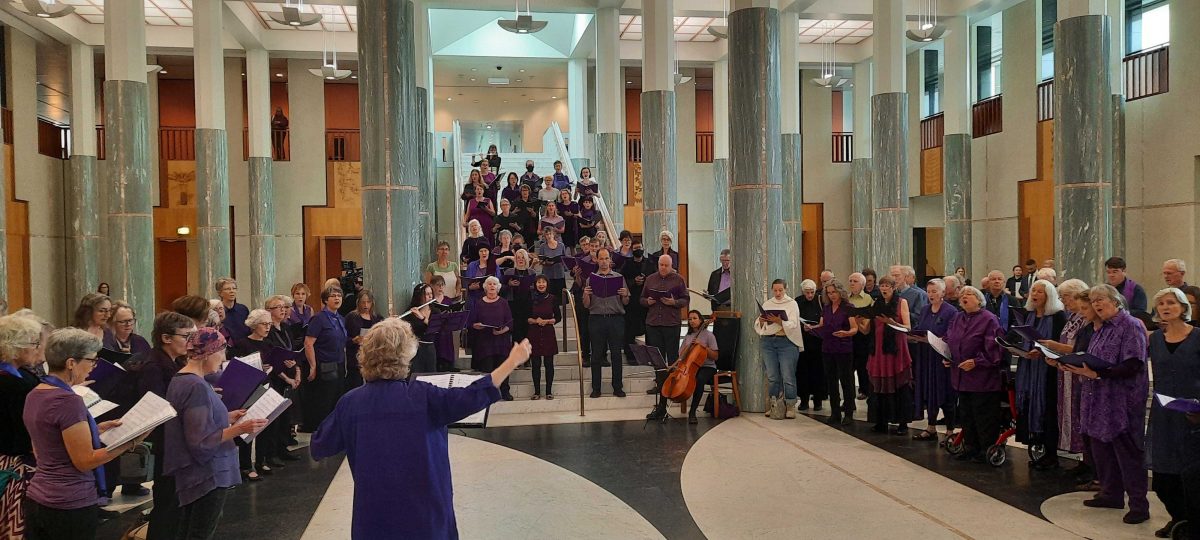
A Chorus of Women perform at Parliament House on 21 March to mark 20 years since their Lament for the people of Iraq. Photo: Ian Bushnell.
It was a powerful moment 20 years ago on 18 March on the steps of the Parliament House foyer when a group of Canberra women expressed in song their sorrow as Prime Minister John Howard rose in the chamber to commit Australia to what many believed was an illegal war in Iraq.
One woman sang from one staircase, “Open the doors of the chambers”, and another responded, “of your hearts”. It was the signal for 150 other women who had unassumingly entered the foyer in ones and twos to join them in a Lament for the people of Iraq.
ABC’s 7:30 dubbed them a “Chorus of Women” and the name stuck. They have since been told how, on that momentous day, they sang on the right side of history.
Twenty years later, the celebrated ensemble returned to the scene of what they insisted was not a protest to again fill the marble hall with their ethereal sounds in the name of peace.
A core group of those women who were there on the day were back in the foyer, including Glenda Cloughley who wrote the Lament’s words and musical tour de force Judith Clingan, who wrote the melody.
It was Judith who sang first and Glenda who responded.
The Lament was born only four days before the impromptu performance at Parliament House out of the grief Glenda felt at the anger of the anti-war protests and the coming storm for the Iraqi people.
“At peace rallies, there was such much anger and all I could do was cry,” Glenda recalls.
“And so, the song was born out of the grief of what was going to happen to the Iraqi people. I thought to begin with this was just me actually, but when I asked Judy to write the tune, it was there waiting inside her, and that proved to be the case with Canberra women as well.”
The chief of security did approach them but something remarkable happened.
He told Glenda that while “many of us” might agree with what they were singing about, it was a protest and that was not allowed in the House.
“I said, ‘It’s not a protest,” Glenda says. “It’s a lament for the people who will die, and he said, ‘All right, finish your song and go in peace.'”

Women who sang the original Lament at Parliament House in 2003. Glenda Cloughley, with headdress, is in the centre. To the right is now musical director Johanna McBride and Judith Clingan.
The story of the Chorus of Women’s Lament went out across Australia and around the world.
The words of the Lament were read into Hansard, and the women’s action has been called a significant expression of Australian democracy.
Thousands of copies of the handwritten manuscript of the music and words were printed and distributed all over Australia and it became an anthem for peace.
“We knew from the uptake of the song that it actually was already in people’s hearts,” Glenda says.
“That encouraged those of us who felt that we’d started something to continue.
“We decided to write our own music because we were rekindling that ancient voice of the citizens’ chorus from the old Greek theatre in Athens.”
It is worth noting that in Greek theatre, the chorus often speaks the hidden or inconvenient truth.
The Chorus has since written more than 100 songs, written and produced major productions, sung in most of the national institutions in Canberra, given about 230 performances, and toured the country and overseas.
Last year it was awarded the ACT Chief Minister’s Rotary Peace Prize, sparking fresh interest in Lament as a source of public inspiration about the Earth and future generations, as well as social justice and peace.
The new Lament performed this week includes a new call to women and men for renewal.
Glenda says it is also a call for a more collaborative approach to issues confronting the nation instead of being so adversarial.
“We’re singing for what people long for in the world,” she says.
“Harmony binds all things, and so we sing of that harmony, we sing for it, and the voice of it is the voice of love actually. We sing for love of the Earth, for love of peace, and for love of our grandchildren and the world they will inherit.”












